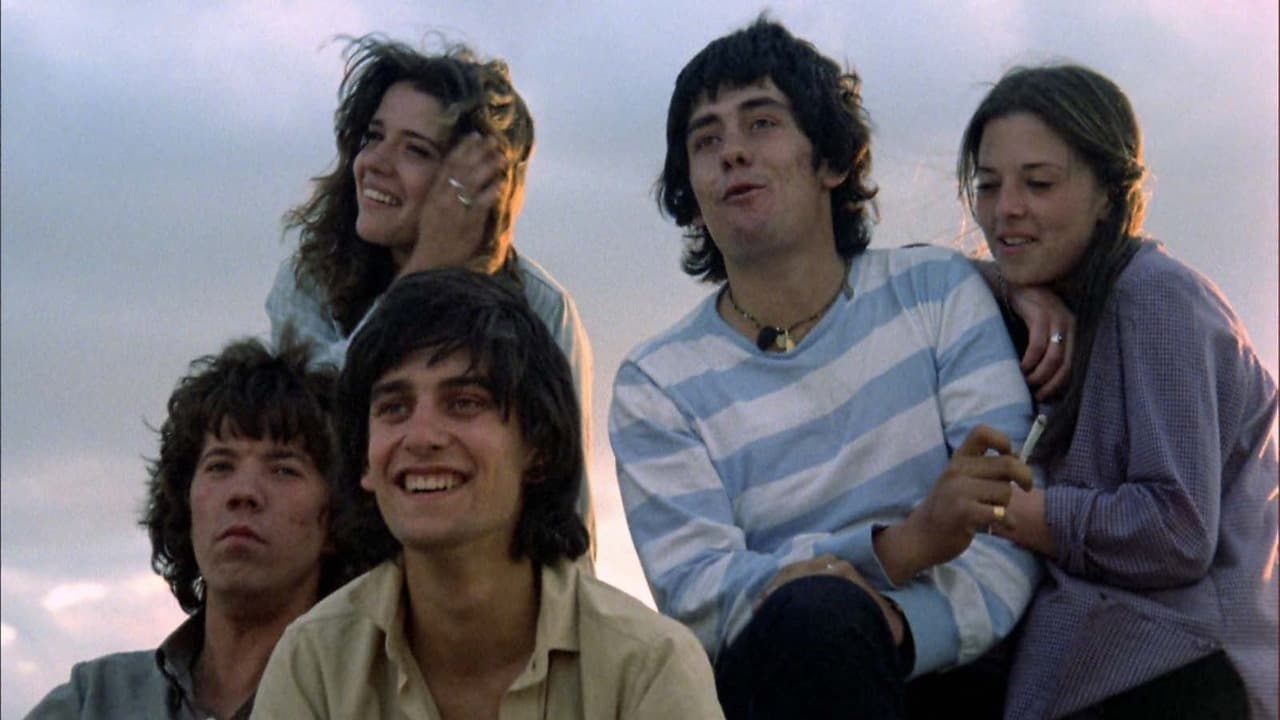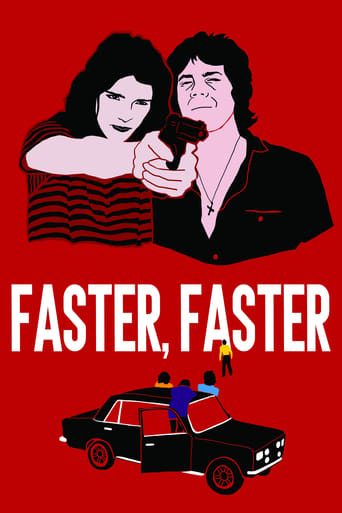

Best movie of this year hands down!
... View MoreThis is one of the few movies I've ever seen where the whole audience broke into spontaneous, loud applause a third of the way in.
... View MoreThere are moments that feel comical, some horrific, and some downright inspiring but the tonal shifts hardly matter as the end results come to a film that's perfect for this time.
... View MoreIf you're interested in the topic at hand, you should just watch it and judge yourself because the reviews have gone very biased by people that didn't even watch it and just hate (or love) the creator. I liked it, it was well written, narrated, and directed and it was about a topic that interests me.
... View MoreMuch like the renegade lovers of Terrence Malick's classic independent debut "Badlands," the renegade lovers of Carlos Saura's "Deprisa, Deprisa" are hollowed-out creatures with jittery instincts and a desperate need to escape, more than anything, boredom and the inevitably painful disillusionment of young adulthood. However, Malick imbues his film with a nostalgia of lost youth that gives way, almost hypnotically (Sissy Spacek's Holly seems to be in a trance the entire film), to the empty-headed, unaffected, face-life-head-on bravado of the dissatisfied and delusional Kit. Unlike Kit and Holly, Pablo and Angela of Saura's film aren't hypnotized or going through the motions. Their crime spree is not an existential courtship either. Theirs is a materialistic crusade against the press of time and the demands of society. They will make their living on their own terms, and they're not in the least bit afraid to don ski-masks and cheap fake mustaches, to carry pistols and sawn-off shotguns, and they're not afraid to make a run for it. For them, it's a carnival ride, whereas with Kit and Holly, it was a spiritual journey through the hostility of the deserted badlands. Saura is not so romantic. He sees his youths as ticking time bombs with their heads far above the clouds. The enthusiasm with which they carry out their makeshift robberies is indicative of a childish imitation of such romantic outlaws as Bonnie and Clyde. They are in over their heads, playing catch up with their fantasies. What Pablo and Angela fail to realize is that their fantasies are much to fast to catch. Hence the title. Saura portrays this with such distinction, with such control and attention to character that we cannot help but be caught up with Pablo and Angela despite our unease in watching their recklessness. This is the mark of a truly powerful filmmaker, one who can bring us along the journey and make us feel the feelings of the characters in the process. When Angela walks off into the purple evening sky during the last shot of the film, we know that she knows her life has lost its luster in the furious pursuit of some wild dream. We know that the future only holds a lack of the past for her and that any speed she maintained with her lover is coming to a screeching, unforgiving halt.
... View MoreIntelligent and thrilling film based on facts about juvenile delinquency in Spain since the 80s . Well directed by Carlos Saura who tried to create a sort of Spanish Neo-Realism by tackling the juvenile delinquency in the Madrid's poor quarters from a sociological point of view. In his second stage dealing with delinquents , the first was ¨Los Golfos¨, he tried to take a position in observation of outcast people, and he got to make a documentary-style cinema. It deals with a group of inseparable friends delinquents named Pablo (Valdelomar) , Meca , El Sebas forced into street hustling and ever-expanding life of crime . The three of them carry out car-thief and scheme bank-robbery to earn money in and around Madrid slums . So, they'll have to gather some money and in order to do anything that's necessary to escape the poverty and also as part of the street life they have drugs . The young street-criminals in Madrid embark on a series of armed robberies to raise the money that they use to rise their existence . Meanwhile, Pablo falls in love for a bar girl named Angela (Socuellamos) and gather together with their friends . The protagonists choose to live dangerously and they are forced to live a life of crime to survive and flee the suburbs of Madrid.¨Deprisa , Deprisa¨ is one of several movies dealing with youth delinquency in Spain during the 70s and early 80s along with ¨Perros Callejeros I and II¨, ¨Navajeros , "Colegas" ,"El Pico", "El Pico 2" and later ¨La Estanquera De Vallecas ¨ , among others . These films were notorious in the years of the Spanish transition to democracy including provoking and polemic issues and played by unknown young people . His style is pretty much urban and realistic as well in the atmosphere as in the fresh dialog and attempted to take a position in favor of outcast people . Drugs , delinquency, and generational problems are the habitual subjects in these films and specially dedicated to the underworld of heroin . Passing of time hasn't had mercy with most of those movies , but they represented a time and a way of life in the history of Spain ; and now they may seem a little bit naive . In ¨ Deprisa , Deprisa¨ or ¨Fast , faster¨ we watch the day-by-day of a group of delinquents committing violent crimes , however Saura got to make a both lyric and documentary-style flick . A great look at young life and friendship in the margined side let the story flow efficiently and being realized in realistic style . We see their troubles growing in such a low-class "barrio" called Vallecas from Madrid outskirts and some fine locations . The director creates a sort of Spanish Neo-Realism by tackling the juvenile delinquency in the Madrid's poor quarters from a sociological point of view . Carlos Saura shows the ugliness of those "barrios" , toughness and cold existence . The screenplay is such strong with disagreeable events , including a love story and violent scenes , though also with some ingenuousness , but in 1980, a few years after General Franco died it wasn't naive at all. Saura chose young and natural actors as Valdelomar and Socuellamos who play their part to the hilt , unafraid of filmmaker's unsympathetic camera and the particularity of the characters. Passable photography with juicy atmosphere by Teo Escamilla , deemed one of the best Spanish cameraman , but unfortunately turns too much murky in some video print , being necessary a a correct remastering . Musical score includes a lot of flamenco songs by that time with the successful Los Chichos. The motion picture is well directed by Carlos Saura , a good Spanish movies director. He began working in cinema in 1959 when he filmed ¨Los Golfos ¨(1962) also dealing with juvenile delinquency . Saura is a well recognized filmmaker both nationally and internationally, and in proof of it he won many prizes among which there are the following ones: Silver Bear in the Berlin Festival for ¨ La Caza or The Chase¨ (1966) his most successful film , and for Peppermint Frappé (1967), in 1967. Special Jury Awards in Cannes for La Prima Angélica (1974), in 1973, and for Cría Cuervos (1976), in 1975. Also, the film Mamá Cumple Cien Años (1979) got an Oscar nomination in 1979 as the best foreign film, and it also won the Special Jury Award at the San Sebastian Festival. In 1990, he won two Goya , The Spanish Oscar , as best adapted screenplay writer and best director. Saura became an expert on Iberian musical adaptations as ¨Carmen , Amor Brujo , Bodas De Sangre , Sevillanas ,Iberia , Salome, Fado, Flamenco ¨ and even recently Opera as ¨Io , Don Giovanni¨
... View MoreA good look at the delinquency in Spain of the 80's, good photography, great soundtrack.Pablo, Angela, El Meca and Sebas, four marginalized teenagers from Madrid are forced to live a life of crime in order to survive and escape the poverty they live in. The movie is quite entertaining, the crime scenes are very realistic, the soundtrack fits just perfect and the message is clear and powerful. Crime is created by poverty and poverty is created by luxury, something we are all responsible of. A great political statement, then and now.
... View MoreA good directed film, based on juvenile delinquency, with a marvelous photography.Not the best of this genre but its well done and has a great sound track that explains this world so purely, with the masters of rumba (Los Chunguitos).The director, influenced by other films like `Perros Callejeros` used real kids from the streets to give the film a more realistic touch.The main actor (Jose Antonio Valdelmoro) Pablo in the film,died two years later the same way as told in the film.Pablo and Angela are in love,but also they are poor and together with their friends El Meca and Sebas they are forced to live a life of crime to survive and escape the suburbs of Madrid.The four of them steal cars and plan armed robbery`s to earn money,and also as part of the street life they do drugs.These kids are known as good people among there neighbourhood,but can also be violent and very dangerous.Will they live to see their dreams come true and make it out of this world?Watch this movie and find out!Very entertaining.
... View More